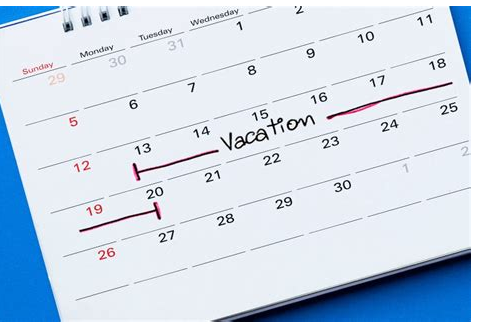TravelBestForyYou.com
How Long Should a Vacation Be? The Ultimate Guide to Unplugging
So, you’re staring at your calendar, that enticing block of “Vacation Time” mocking you with its blankness. How long should that blissful escape actually be? Is a week the magic number? Two? A month-long backpacking trip through Southeast Asia? The truth is, there’s no single right answer. It’s a question as nuanced as the individual asking it, a complex interplay of personal preferences, financial constraints, and the surprisingly scientific study of relaxation itself. We’ve all heard tales of the “vacation hangover” – that post-holiday slump, a jarring return to reality. But studies suggest it’s not just about *how* you vacation; it’s also about *how long*. Research indicates that shorter breaks (think weekend getaways) often provide a temporary boost but lack the depth needed for sustained stress reduction. Longer vacations, however, allow for a more gradual transition into relaxation mode, leading to more significant and lasting positive effects. But is a longer vacation *always* better? Not necessarily. The sweet spot, it seems, balances true rest and recuperation with the avoidance of that post-vacation crash.
Let’s talk science, my friend. A study published in the Journal of Happiness Studies showed a significant correlation between vacation length and happiness levels. Participants reporting longer vacations (7 days or more) experienced consistently higher levels of overall happiness. However, a different study suggested that the benefits plateau after approximately 10 days. Beyond that, the rejuvenating effects seem to diminish, and that post-vacation blues might creep in. This isn’t to say that month-long adventures are a bad idea! It’s simply a matter of expectations and planning. Think of it like this: a marathon runner doesn’t train for a sprint. Similarly, a long, immersive trip demands meticulous planning to avoid burnout.
My own disastrous attempt at a “quickie” three-day beach trip springs to mind. Three days wasn’t enough to fully unwind from the year’s stress. Packing, travel time, and adjusting to a new environment ate into my precious relaxation time. I came back feeling more exhausted than before! Conversely, a two-week trip to Italy once completely rebooted my system. I returned refreshed, inspired, and with a wealth of memories. The difference? Proper planning and a realistic expectation of what I could achieve in the allocated time. The key is to find your personal equilibrium – your ideal duration for true vacation bliss.
The Psychology of the Perfect Getaway
So, what’s the secret to choosing the right vacation length? It’s not just about numbers; it’s about mindset. Consider these key factors:
- Your stress levels: Are you burnt out? A longer break might be necessary. Feeling relatively relaxed? A shorter trip might suffice.
- Your travel style: A fast-paced city break requires less time than a slow, meditative retreat.
- Your budget: Obviously, longer vacations are generally more expensive.
- Your work commitments: Can you truly unplug? If not, a longer break might be wasted if you’re constantly checking emails.
Think of your vacation like a delicious meal. A tiny appetizer (short break) might whet your appetite, but a full course meal (longer break) allows for deeper satisfaction. We need time to savor the experience, to fully immerse ourselves in the new environment. A rushed vacation is like eating a gourmet burger in under a minute! You’ll taste *something*, but it’s not the same as savoring each delicious bite.
Beyond the Numbers: Quality Over Quantity
One thing is clear: The length of your vacation is less important than the quality of your time off. Disconnect from work, embrace spontaneity, and allow yourself to fully recharge. This means setting boundaries, silencing notifications, and creating space for mindful experiences. A truly restorative vacation is about more than sightseeing; it’s about inner peace. Imagine comparing two vacations: one a hectic whirlwind tour of five countries in seven days, and the other a relaxed week exploring a single charming village. Which one will leave you feeling truly rested and refreshed? My bet’s on the village.
Remember, a vacation isn’t just about escaping; it’s about recalibrating. It’s about returning to work feeling renewed, inspired, and ready to tackle new challenges. And the length of that recalibration period is unique to each of us. There’s no universal formula, no magic number of days to guarantee perfect rejuvenation. It’s about understanding your needs, acknowledging your limitations, and prioritizing your well-being. This is your life, your time; invest it wisely.
How Long Should a Vacation *Really* Be? The Verdict
Ultimately, the question of “how long should a vacation be?” is personal. It’s not a mathematical equation with a single solution; it’s a journey of self-discovery. While research suggests a sweet spot between 7 and 10 days for optimal rejuvenation, your ideal length might be shorter or longer depending on your circumstances, preferences, and personal definition of rest. The crucial factor isn’t the number of days but the intentional creation of a space for true relaxation and rejuvenation. It’s about achieving that perfect balance between escapism and mindful rejuvenation – a journey back to yourself. So, go forth, plan your escape, and create a vacation that truly nourishes your soul.
Think beyond the days and focus on the experience. What kind of vacation will truly recharge *you*?

